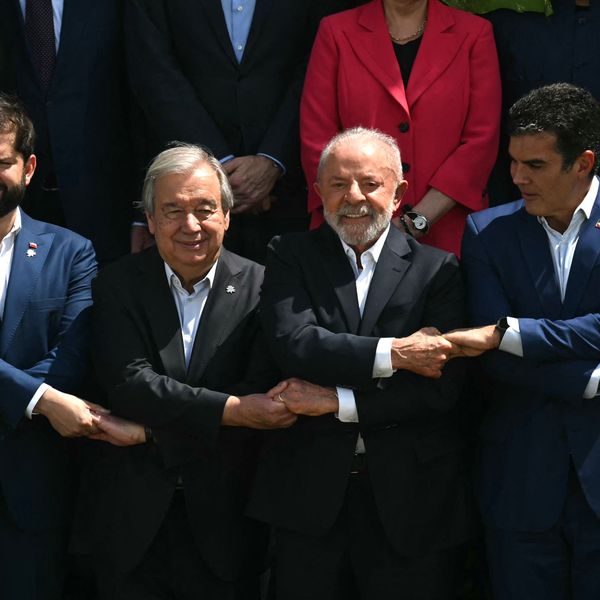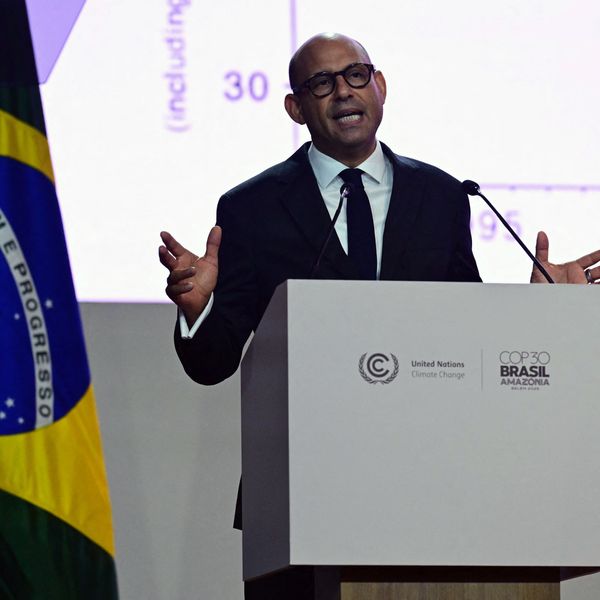It's been one month since the largest climate march in history, and recent "Climate Action" pledges from global leaders like the Department of Defense, President Obama and the United Nations do not add up to what communities need.
The People's Climate March on Sunday September 21, 2014 was a major historic event. It was historic because of the unprecedented numbers--400,000 people came out to march. It was historic because the participants and leaders of the march were made up of primarily people of color on the frontlines of the climate and economic crises. Communities impacted by Hurricane Sandy, youth of color doing environmental justice work, and indigenous peoples from around the world, led a broad march from many sectors including faith communities, labor, and more. For Grassroots Global Justice Alliance (GGJ), as co-anchor of the Our Power Campaign, it was historic to mobilize for this march because of the way the grassroots organizing sector and climate policy organizations came together to collaborate in the planning of the march, and laid the groundwork for strengthened relationships and a broader united movement for climate justice.
In the days following the march, people took action to pressure the United Nations and global leaders to take real action on Climate Change. On Monday September 22, Occupy Wall Street activists responded to a call to action from grassroots organizers of the Our Power Campaign and organized the Flood Wall Street mass sit-in. On Monday September 22 and Tuesday September 23, the Our Power Campaign held a People's Climate Justice Summit and a People's Tribunal to offer up community-led solutions and called out the UN the false promises masquerading as "climate action." Grassroots organizers used these events to urge global leaders to catch up to communities who have put forth authentic climate actions that address real needs.
Unfortunately, the UN response was far from historic. The UN Climate Summit's branding was deceptive: "I'm for Climate Action." At first glance, that may seem like a good thing. We want action on climate, right? However, what the UN calls "Climate Action" is not the kind of action that communities around the globe need, so much so that on Tuesday September 23, members of the Our Power Campaign delivered a statement to the UN that called the summit "little more than a pep rally pushing carbon trading offsets and weak voluntary or limited pledges for emission cuts leading up to the global climate treaty negotiations in Paris next year."
President Obama's response was disappointing as well. He shared the UN's rhetoric about "taking action" and "reducing emissions" yet the pledges the US made will not get us anywhere close to where we need to be in order to prevent major climate catastrophes.
One month after the historic People's Climate March in New York City, we still have yet to see global leaders make moves to take the "climate action" that frontline communities really need.
Last week, the Department of Defense (DOD) released their 2014 Climate Change Adaptation Roadmap, which referred to climate change as a "threat multiplier."
While it's notable that the DOD acknowledges the devastating impacts of climate change will have on the world's most vulnerable populations, the majority of the report focuses on the impacts climate change will have on the US military's "more than 7,000 bases, installations, and other facilities." In fact, this report appears to make the case for increased militarization in places where the US has "assets," and for more investment into expanding military operations.
Increased militarization will not make things better for poor and low-income families, is more likely to lead to greater political destabilization in many countries of the Global South, and heightens police violence in communities of color, as recent events in Ferguson, Missouri clearly illustrated in the aftermath of the killing of Michael Brown.
The DoD is one of the world's largest emitters, and the single largest consumer of energy in the US, yet renewable energy has never represented more than 5% of total DOD facility consumption. The DOD should instead prioritize their mitigation plans and take on the lion's share of U.S. goals to reduce greenhouse gas emissions.
Despite inaction from global leaders, the People's Climate activities last month were historic. But what happens next matters even more. Frontline communities in the U.S. and around the world are struggling every day to survive this climate crisis, and are organizing around community solutions to climate change. They are prioritizing community-led projects and local infrastructure that can create jobs and put their communities back to work, particularly in the areas of zero waste; regional food systems; public transportation; clean community energy; efficient, affordable, and durable housing; and ecosystem restoration and stewardship.
GGJ members are also working with organized communities around the world to create a new climate agreement, written with collective input from civil society, to influence upcoming UN climate meetings in what we are calling the People's Climate process.


